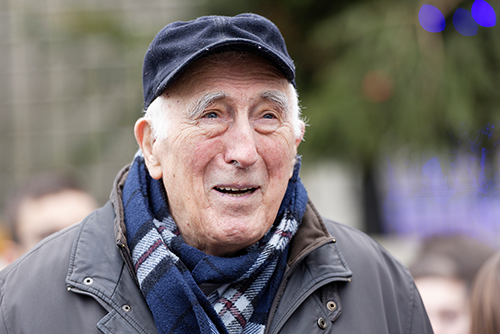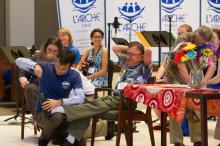Jean Vanier
Jean Vanier (1928 - 2019) was a Canadian spiritual leader and one of the founders of L'Arche, a network of international communities where people with and without intellectual disabilites live together. He was the author of numerous books on Christian spirituality, including Community and Growth and several articles for Sojourners. Nine months after his death, a report from L'Arche found that six women had credibly accused him of spiritual and sexual abuse.
In 2023, Sojourners published Lead Us Not, a podcast following those who once admired Jean Vanier as they try to understand: When trusted leaders commit sexual and spiritual abuse, how do our communities move forward?


Reading the flood of obituaries and tributes to Jean over the past weeks, I have been struck by this insight: Jean’s central message about transforming structures of privilege to build community across every imaginable kind of difference makes sense without reference to Jesus — but his life doesn’t. His deepest desires and choices were all tied to his reading of the gospel stories of Jesus and his community.

ON A BALMY SUMMER afternoon in July, I rang the bell at Jean Vanier’s sky-blue gate in Trosly-Breuil, France. Vanier, the founder of L’Arche, an international federation of communities of people with and without developmental disabilities, is central to a new documentary film, Summer in the Forest. I was there to interview him about the film and as research for a play I’m helping to write for the 50th anniversary of L’Arche Daybreak community, near Toronto.
As the gate opened, Vanier, wearing his signature navy blue jacket, greeted me with the warmest presence I have ever felt, saying, “All the way from Daybreak you have come to visit me!” I replied sheepishly, “Yes, to finally meet the man who changed my life.”
My salutation was not hyperbole—Vanier’s gift, a vision of communities where people live in a spirit of mutual learning, dignity, and care, has touched and changed the lives of thousands of people around the globe. Though I’d come for professional reasons, it also felt like a pilgrimage to seek Vanier’s wisdom in the place where it all began. He ushered me into his small office and living room to chat.
In 1964, while Vanier was living in Trosly-Breuil, he visited a psychiatric hospital near Paris. He saw men there subjected to violence, locked up all day, and feared by the public. He was moved with a compassion that he couldn’t totally understand at the time. But as Vanier told me, “We all have, as human beings, a design that teaches us to reach out to others, and not only to serve ourselves. If we listen to this inner design, this inner voice, it will lead us always to do what is right.” With little training and no formal plan, Vanier bought a dilapidated house and took three of the men out of the institution to live with him in the village.
The first night didn’t go so well, as they could not find how the electricity worked and one of the men became so frightened and violent, smashing windows, that he had to return to the institution the next day. Two of the men, Raphaël Simi and Philippe Seux, lived with Vanier for the rest of their lives. Vanier named their home “L’Arche,” French for “The Ark”—it became the first of what are now more than 150 L’Arche communities in 37 countries.

“This is how the world is meant to be.” That’s what Randall Wright, director of the exceptionally powerful new feature-length documentary Summer in the Forest, said he thought the first time he visited one of the L’Arche communities founded by Jean Vanier that are the subject of his film.

This week marks the 25th anniversary of the Americans with Disabilities Act. The ADA is responsible for the wheelchair icon in the convenient parking spaces, for the Braille numbers in the elevator, for the accommodations made for students with learning differences in the classroom, and for closed captioning on television. It has provided people with all kinds of physical and mental disabilities access to places and experiences that the majority of people in America take for granted. New York’s Mayor Bill DeBlasio even declared July “Disability Pride Month” in the city. All of this is very much worth celebrating.
And yet, while people with disabilities have more access to opportunities and experiences than ever before, to assume that that ADA has remedied the problem of exclusion and prejudice against people with disabilities would be like assuming that the Civil Rights Act remedied racism. Such prejudices and the oppression they engender reach deep into our hearts; they involve our deepest fears and insecurities.

Krista Tippett, host of the successful podcast On Being, is one of those transformed people. She described to Sojourners how her radio pilgrimage to an Iowa L’Arche community and an interview with L’Arche founder and Templeton Prize winner Jean Vanier influenced her way of thinking about Christianity:
“What I love about L’Arche is that it is a living manifestation of some of the most paradoxical and lofty ideals of Christianity — strength and weakness, light and darkness — that our culture and some of our churches can barely grasp. It’s very countercultural, very paradoxical. But it’s embodied at L’Arche—lived and breathed in an everyday way.”
After a flower procession and a dramatization of the origin story of L’Arche, Tippett joined in on the 50th-anniversary celebrations by publicly interviewing four L’Arche community members.

The problems of the world can overwhelm us. When we are confronted by the Divine in the cries of human need, we may, like Isaiah, feel unworthy and ill-equipped to respond. However, if we allow this Divine experience to transform our human weakness, we can find the courage and strength to answer that call, as Jean Vanier has, with a bold, “Here I am!” What follows may be more difficult than we can imagine, but we can be confident in the knowledge that the work we do is Holy work.

Jean Vanier, an advocate for people with developmental disabilities who helped create an international network of residential communities that champion the rights of their residents, has won the 2015 Templeton Prize.
A Roman Catholic layman and a lifelong student of philosophy and theology, Vanier is best known as the founder of L’Arche — French for "the Ark" — a global network of communities where those with and without disabilities live side by side as equals.
The network was begun in northern France in 1964 when Vanier invited two intellectually disabled men to live with him as friends. It has evolved into 147 L’Arche communities, in 35 countries. In addition, a support group for families of people with disabilities, known as Faith and Light, has spread to 82 countries.
“One can conceive of L’Arche and Faith and Light as living laboratories where Vanier essentially exposed his ideas to the most challenging test of all — real people, real problems and real life,” said John Swinton, a professor at the University of Aberdeen, Scotland Divinity School, in nominating Vanier for the award.
In a statement at a news conference in London, Vanier, 86, said those with intellectual disabilities offer spiritual lessons and gifts to a world too driven by success and power.

Today is the Feast of Christ the King, the last Sunday in our church year.
I always find it a strange feast to celebrate in a democracy, in which the whole point is that we do not have kings, but shared authority vested in the people and temporarily delegated to elected leaders. What does thinking about Jesus as a King mean to folk like us?
This year it is particularly strange, for, with the exception of the marriage of William and Kate, this has been a bad year for kings. Monarchs, tyrants, plutocrats, and autocrats of every stripe have found themselves under assault from a powerful wave of populism, as the citizens of country after country have risen up to hold their leaders accountable for their stewardship of their nations. Throughout the Middle East and in parts of Europe and the United States, the official narrative of power has been held up and judged against another set of ideas, one that speaks of fairness, liberty, and raising up the poor. Ruler after ruler has heard a cry that translates, roughly: “as you did it to the least of us, so shall it be done to you.”
Christ is a different kind of king, and his authority always calls our leaders to account, whatever the form of our government or our political preferences. Christ embodies a form of leadership that is rarely seen in our world. In the ordinary scope of things, our leaders wear nice suits and inhabit the corridors of power and cut deals with the wealthy and the powerful. Christ, however, threw in his lot entirely with those whom the doors of power shut out. He would talk with anyone, eat with everyone, and, in the end, died among the refuse of his people. He was a leader who led from below.
During my last year of college, my pastor lent me the book Living Gently in a Violent World, co-authored by Jean Vanier and Stanley Hauerwas. This book is an exploration on how followers of Christ ought to live in broken world.
The introduction of the book recounts the story of Jean Vanier teaching a course on pastoral care. During one class, Vanier asked the students to share some of their spiritual experiences. One of the students, Angela (who was deaf) began to share a dream she had where she met Jesus in heaven. She recalled talking with Jesus for some time and never experiencing so much joy and peace. "Jesus was everything I had hoped he would be," she said, "And his signing was amazing!" Vanier explains to the reader that "for Angela, heaven's perfection did not involve being 'healed' of her deafness. Rather, it was a place where the social, relational, and communication barriers that restricted her life in the present no longer existed."